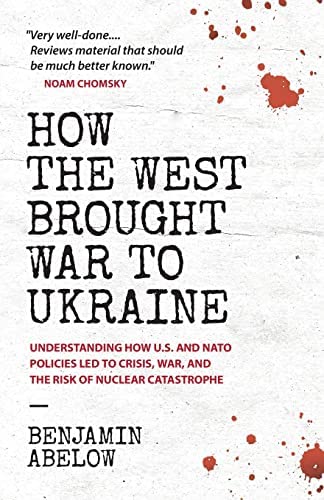Book/How The West Brought War to Ukraine
Personal notes and review of Benjamin Abelow’s new book about How The West Brought War To Ukraine. For anyone interested in understanding the true causes of the disaster in Ukraine, this book is essential reading…

How The West Brought War To Ukraine - Understanding how U.S. and NATO policies led to crisis, war, and the risk of nuclear catastrophe
The current western narrative depicts Vladimir Putin as an insatiable Hitler-like expansionist that invaded Ukraine. Any historical context is removed, portraying Russia’s act of war as an abhorrent unprovoked land grab, leaving the west no other option than supporting Ukraine with all its might to fight Russia until the last Ukrainian.
Unfortunately, this narrative, promoted by the U.S., NATO, and its allies, is not only detrimental to Ukraine but also poses an existential threat to all of us by exacerbating the risk of nuclear catastrophe, and is therefore criminally insane.
Abelow’s book aims to adduce crucial historical context that is virtually unmentioned by the Western narrative, as it exposes its current strategy to resolve this conflict by “winning the war” against Russia as a lunatic enterprise. My favourite passage is in the book’s introduction on how the narrative drives the war, p.8-9. Abelow manages to succinctly enumerate key events leading to the escalation of the conflict by explaining how…
…[d]uring the past three decades, the U.S., sometimes alone, sometimes with its European allies has:
Expanded NATO over a thousand miles eastward, pressing it toward Russia’s borders, in disregard of assurances previously given to Moscow
Withdrawn unilaterally from the Antiballistic Missile Treaty and placed antiballistic launch systems in newly joined NATO countries capable of firing offensive nuclear weapons at Russia
Helped lay the groundwork 1, and may have directly instigated 2, an armed, far-right 3 coup 4 in Ukraine, replacing a democratically elected pro-Russian government with an unelected pro-Western one
Conducted numerous NATO military exercises near Russia’s border including live-fire rocket exercises aimed at simulating attacks on air-defense systems inside Russia
Asserted, without strategic need, that Ukraine would become a NATO member despite knowing full well this would cross a red line for Russia. To make matters worse NATO then refused to renounce this policy even when doing so might have averted war
Withdrawn unilaterally from the Intermediate-Range Nuclear Forces Treaty, increasing Russian vulnerability to a U.S. first strike
…
Led the Ukrainian leadership to adopt an utterly uncompromising stance toward Russia, further exacerbating the threat to Russia and putting Ukraine in the path of Russian military blowback
Despite these provocations, Russia did not have the right to start what can only be referred to as a despicable act of aggression towards Ukraine. One possible alternative for Russia could have been to develop close diplomatic and economic ties to Europe with, inter alia, the aim to retain a neutral zone between Russia and NATO, providing a counter balance to U.S. and NATO expansion and hegemony in this region.
“While it is difficult to look at the horrific images coming out of Ukraine without revulsion and anger, succumbing to blind emotion and embracing the dominant Western narrative, …” 5 we have to recognise our role in this conflict. After all, we are responsible for the predictable consequences of our own actions, and Abelow aptly demonstrates that the crisis in Ukraine was predictable, predicted - and avoidable.
Personal Notes
In August 2022 Zelensky stated that “We will not forget that the Russian war against Ukraine began with the occupation of Crimea.… This Russian war … began with Crimea and must end with Crimea - with its liberation,…" 6 revising his previous position demanding that Russia must withdraw to pre-invasion position for a deal, that is “[t]o stop the war between Russia and Ukraine the step should be regaining the situation as of 23 February” 7. I always wondered how the russian annexation of Crimea and the conflict in the Donbass region were connected. To better understand the origin of the Ukraine-Russia conflict it very much helped to understand the role of the far right in the Euromaidan demonstrations 3 4 in combination with a description of Crimea before and after Annexation 8, a narrative completely suppressed in The West.
The best possible outcome for Ukraine and its citizens is to return to the negotiating table with Russia and work out a compromise. A compromise is an agreement or settlement of a dispute that is reached by each side making concessions. I am sure a solution where both sides can get out of this conflict without losing face is attainable. More importantly, a truce presupposes a compromise and therefore acts as a first step to stop the killing and destruction of vital infrastructure. We (i.e. Europe) must stop to take an uncompromising stance towards Russia and support Ukrainian leadership to work out a diplomatic solution to the conflict.
Abelow has also written an essay on this topic, so people could have free access to the ideas in the book.
An excellent interview with Abelow on the Ukraine War with the Swiss Magazine Die Weltwoche debunks the usual pro war talking points and puts forward proposals to resolve the current crisis.
-
Branko Marcetic, “A US-Backed, Far Right–Led Revolution in Ukraine Helped Bring Us to the Brink of War”. ↩︎
-
BBC, “Ukraine crisis: Transcript of leaked Nuland-Pyatt call”. ↩︎
-
Ivan Katchanovski, “The far right, the Euromaidan, and the Maidan massacre in Ukraine”. ↩︎
-
Ivan Katchanovski, “The hidden origin of the escalating Ukraine-Russia conflict”. ↩︎
-
Benjamin Abelow, “How The West Brought War To Ukraine”, p.50. ↩︎
-
BBC, “Ukraine war: Russia must withdraw to pre-invasion position for a deal”. ↩︎
-
Ivan Katchanovski, “Crimea: People and Territory before and after Annexation”. ↩︎